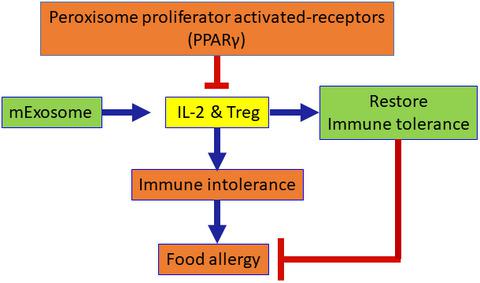当前位置:
X-MOL 学术
›
Immunol. Cell Biol.
›
论文详情
Our official English website, www.x-mol.net, welcomes your feedback! (Note: you will need to create a separate account there.)
Specific antigen-guiding exosomes inhibit food allergies by inducing regulatory T cells.
Immunology and Cell Biology ( IF 4 ) Pub Date : 2020-05-07 , DOI: 10.1111/imcb.12347 Dian Yu 1 , Jiang-Qi Liu 2 , Li-Hua Mo 1, 3 , Xiang-Qian Luo 3 , Zhi-Qiang Liu 1, 2 , Gao-Hui Wu 4 , Li-Teng Yang 4 , Da-Bo Liu 3 , Shuai Wang 2 , Zhi-Gang Liu 1 , Ping-Chang Yang 1, 5
Immunology and Cell Biology ( IF 4 ) Pub Date : 2020-05-07 , DOI: 10.1111/imcb.12347 Dian Yu 1 , Jiang-Qi Liu 2 , Li-Hua Mo 1, 3 , Xiang-Qian Luo 3 , Zhi-Qiang Liu 1, 2 , Gao-Hui Wu 4 , Li-Teng Yang 4 , Da-Bo Liu 3 , Shuai Wang 2 , Zhi-Gang Liu 1 , Ping-Chang Yang 1, 5
Affiliation

|
The therapies for food allergy (FA) need to be improved. The generation of inducible regulatory T cells (Tregs) can support immune tolerance in the body. This study aims to suppress experimental FA by inducing Tregs through the employment of modified exosomes (mExosomes). In this study, mExosomes were prepared by incubating dendritic cells with interleukin (IL)‐2 and ovalbumin (OVA, used as a specific antigen) in the culture. Exosomes were purified from culture supernatant and used as the mExosomes. A murine FA model was developed to test the effects of mExosomes on the generation of Tregs in the mouse intestinal tissues and inhibiting FA. The results showed that mExosomes, which carried IL‐2 and a complex of OVA peptide–major histocompatibility complex class II on the surface of exosomes, bound to OVA‐specific CD4+ T cells and induced CD4+ T cells to differentiate into Tregs. In the FA mouse intestinal tissues, we found low IL‐2 levels that were positively correlated with the number of Tregs. Depletion of IL‐2 in mice prevented the generation of Tregs. The levels of peroxisome proliferator‐activated receptor‐γ were increased in the FA intestinal tissues with inhibited IL‐2 production. Administration of mExosomes induced Tregs in the intestinal tissues and efficiently suppressed FA in mice. We conclude that the mExosomes can suppress FA in mice through inducing Tregs. The data suggest that the mExosomes have translational potential in the treatment of FA and other allergic disorders.
中文翻译:

特异性抗原引导外泌体通过诱导调节性 T 细胞抑制食物过敏。
食物过敏(FA)的治疗方法需要改进。诱导型调节性 T 细胞 (Tregs) 的产生可以支持体内的免疫耐受。本研究旨在通过使用修饰外泌体 (mExosomes) 诱导 Tregs 来抑制实验性 FA。在这项研究中,mExosomes 是通过将树突细胞与白细胞介素 (IL)-2 和卵清蛋白 (OVA,用作特定抗原) 在培养物中孵育来制备的。从培养上清液中纯化外泌体并用作 mExosomes。开发了小鼠 FA 模型以测试 mExosomes 对小鼠肠道组织中 Tregs 生成和抑制 FA 的影响。结果表明,在外泌体表面携带 IL-2 和 OVA 肽-主要组织相容性复合物 II 类复合物的 mExosomes 与 OVA 特异性 CD4 +T 细胞和诱导 CD4 + T 细胞分化为 Treg。在 FA 小鼠肠道组织中,我们发现低水平的 IL-2 与 Treg 的数量呈正相关。小鼠中IL-2的消耗阻止了Tregs的产生。FA 肠组织中过氧化物酶体增殖物激活受体-γ 的水平升高,IL-2 产生受到抑制。mExosomes 的给药诱导了肠道组织中的 Tregs,并有效地抑制了小鼠的 FA。我们得出结论,mExosomes 可以通过诱导 Tregs 抑制小鼠的 FA。数据表明,mExosomes 在治疗 FA 和其他过敏性疾病方面具有转化潜力。
更新日期:2020-05-07
中文翻译:

特异性抗原引导外泌体通过诱导调节性 T 细胞抑制食物过敏。
食物过敏(FA)的治疗方法需要改进。诱导型调节性 T 细胞 (Tregs) 的产生可以支持体内的免疫耐受。本研究旨在通过使用修饰外泌体 (mExosomes) 诱导 Tregs 来抑制实验性 FA。在这项研究中,mExosomes 是通过将树突细胞与白细胞介素 (IL)-2 和卵清蛋白 (OVA,用作特定抗原) 在培养物中孵育来制备的。从培养上清液中纯化外泌体并用作 mExosomes。开发了小鼠 FA 模型以测试 mExosomes 对小鼠肠道组织中 Tregs 生成和抑制 FA 的影响。结果表明,在外泌体表面携带 IL-2 和 OVA 肽-主要组织相容性复合物 II 类复合物的 mExosomes 与 OVA 特异性 CD4 +T 细胞和诱导 CD4 + T 细胞分化为 Treg。在 FA 小鼠肠道组织中,我们发现低水平的 IL-2 与 Treg 的数量呈正相关。小鼠中IL-2的消耗阻止了Tregs的产生。FA 肠组织中过氧化物酶体增殖物激活受体-γ 的水平升高,IL-2 产生受到抑制。mExosomes 的给药诱导了肠道组织中的 Tregs,并有效地抑制了小鼠的 FA。我们得出结论,mExosomes 可以通过诱导 Tregs 抑制小鼠的 FA。数据表明,mExosomes 在治疗 FA 和其他过敏性疾病方面具有转化潜力。


























 京公网安备 11010802027423号
京公网安备 11010802027423号